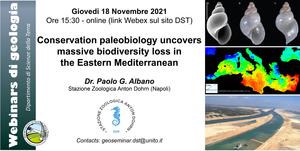Conservation paleobiology uncovers massive biodiversity loss in the Eastern Mediterranean - Dr. Paolo G. Albano (Stazione Zoologica Anton Dohrn, Naples, Italy)
Da: Giovedì 18 novembre 2021 ore 15:30
Fino a: Giovedì 18 novembre 2021 ore 17:00

Conservation paleobiology is an emerging discipline that provides high-resolution records of ecosystem change and variation spanning the whole of human history, enabling the reconstruction of ecological baselines and the trajectories of ecosystem states on timescales well beyond the limits of ecological monitoring.
Climate warming is causing the poleward shift of species distributions. In the Mediterranean Sea, this implies the northward retreat of their southern edges. This semi-enclosed basin, however, is not in natural contact with a suitable pool from which thermophilic species could replace the disappearing ones. The result is a net diversity loss, which cannot be quantified in the absence of baselines. We reconstructed such baselines on the Israeli shelf with conservation paleobiology techniques using shelly death assemblages and dating them with radiocarbon to put our results in a temporal context. We recorded only 12% and 5% of historically present native species on shallow subtidal soft and hard substrates, respectively. This is the largest documented climate-driven regional-scale diversity loss in the oceans. In contrast, assemblages in the intertidal, more tolerant to climatic extremes, and in the cooler mesophotic zone show ~50% of the historical native richness. Importantly, ~60% of the recorded shallow subtidal native species do not reach reproductive size, making the shallow shelf a demographic sink.
As climate continues to warm, the native biodiversity collapse described here will intensify and expand geographically and local communities will become more and more dominated by Indo-Pacific species. These restructured assemblages, shaped by climate warming and biological invasions, are giving rise to a ‘novel ecosystem’ whose restoration to historical baselines is not achievable.
Speaker: Dr. Paolo G. Albano (Stazione Zoologica Anton Dohrn, Naples, Italy)
I am a multidisciplinary scientist at the interface of bio- and geosciences. My main research interest is about the patterns of biodiversity in the Mediterranean Sea and the drivers of its demise. I use death assemblages and the fossil record to reconstruct baselines to quantify change. I hold a PhD in biology from the University of Bologna, I was awarded a Marie Curie individual fellowship at the University of Vienna where I later worked as Principal Investigator of a project on biodiversity loss in the eastern Mediterranean. Since March 2021, I am senior scientist at the Stazione Zoological Anton Dohrn, Italy.
Contacts: geoseminar.dst@unito.it





